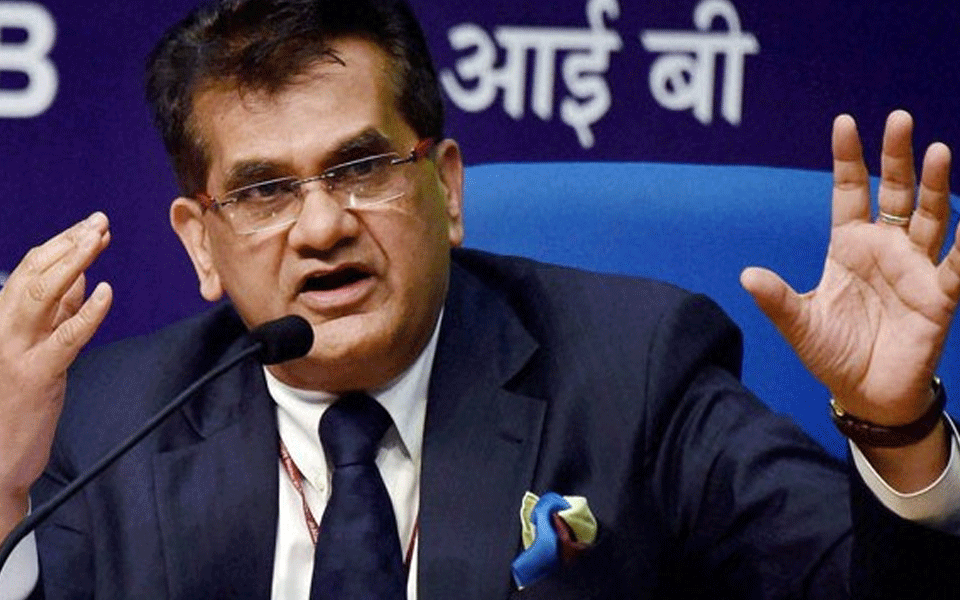New Delhi, Sep 3: India will shortly unveil a one-nation-one-card policy for public transport that will bring seamless connectivity between various modes of transport, NITI Aayog CEO Amitabh Kant said on Monday.
He said a robust transportation sector was the backbone for the development of any economy, especially for a densely populated developing country like India, and the focus of the nation's mobility strategy was on sustainable modes of public transport, transport-oriented planning and digitisation.
"The objective of the strategy is to plan for the citizens first, rather than focusing on vehicles alone, by providing sustainable mobility and accessibility by switching to cleaner mode of transportation," Kant said at the "Future Mobility Summit-2018-India's Move to NextGen Transport Systems".
The road transportation segment alone contributes to around four per cent of India's GDP with the segment still being heavily dependent on fossil fuels.
In the wake of the worsening air quality in the country's major cities, rising concerns of climate change and an ever-increasing oil import bill, mobility is a crucial piece of the development puzzle and the key to unlocking the potential of India's economy and people, the NITI Aayog CEO said.
NITI Aayog Advisor Anil Srivastava said the government was working towards achieving a robust mobility ecosystem across India.
"The citizens, on their part, should work towards sharing a ride, not owning the ride. The government has integrated many stakeholders across departments to drive India's mobility vision," he added.
Let the Truth be known. If you read VB and like VB, please be a VB Supporter and Help us deliver the Truth to one and all.
Bengaluru (PTI): The Karnataka government has issued directions to municipal corporations across the state to regulate and prohibit feeding pigeons in public places, citing serious public health concerns.
Deputy Secretary to Government V Lakshmikanth has written to the Urban Development Department requesting it to issue directions to the Greater Bengaluru Authority (GBA) and all municipal corporations to take immediate steps to implement the measures.
In an official note dated December 16 issued by the Health and Family Welfare Department and released to the media on Wednesday, the department said uncontrolled feeding of pigeons in public places has resulted in large congregations of birds, excessive droppings and serious health concerns, particularly respiratory illnesses linked to prolonged exposure to pigeon droppings and feathers such as hypersensitivity pneumonitis and other lung diseases.
ALSO READ: Chinese GPS tracker found on seagull near Karwar Coast
"The commissioner, the Greater Bengaluru Authority and the Commissioners and chief officers of other municipal corporations shall take necessary action to mitigate the causes of dangerous disease spread by pigeon and enforce specified guidelines in their respective jurisdiction," the note said.
According to the department, these include a prohibition on feeding pigeons or causing pigeons to be fed in areas where it may cause nuisance or pose a health hazard to the public. Pigeon feeding shall be permitted only in designated areas in a controlled manner, subject to certain conditions.
"The designated areas may be selected in consultation with stakeholders. The responsibility for upkeep of the designated areas and compliance to the directions shall be taken up by some charitable organisation or an NGO. The feeding in designated areas shall be permitted only for some limited hours in the day," it said.
The note further stated that authorised officers of local authorities shall issue on-the-spot warnings and may impose fines for violation of the order, or lodge complaints to prosecute offenders under Sections 271 (Negligent act likely to spread infection of disease dangerous to life) and 272 (Malignant act likely to spread infection of disease dangerous to life) of the Bharatiya Nyaya Sanhita.
It also directed local authorities to conduct public awareness campaigns, including the display of signboards, banners and digital messages, explaining the health hazards associated with pigeon droppings and feathers, the content of the regulatory directions and penalties for violations, and alternative humane methods of bird conservation that do not endanger public health.





